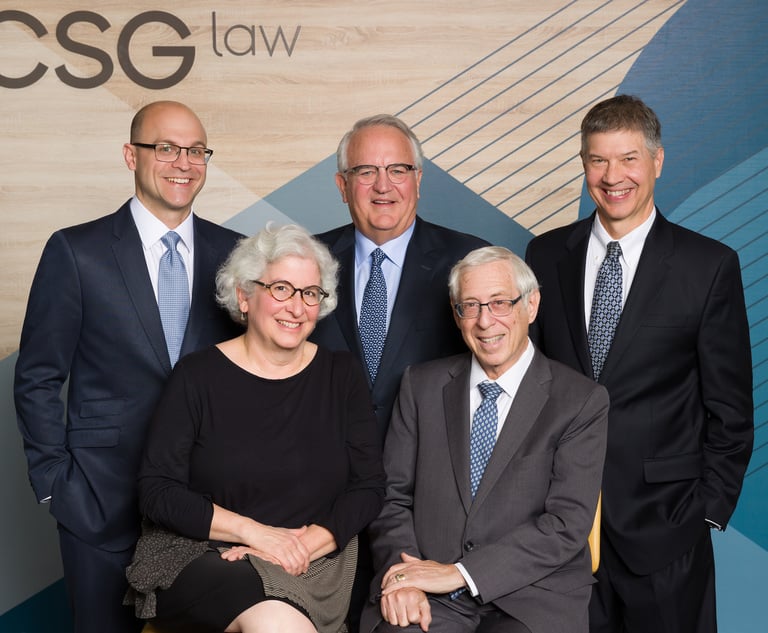 Credit: IR Stone/Shutterstock.com
Credit: IR Stone/Shutterstock.comIs It Worth the Risk to Represent a Client Who Has Fired a Previous Attorney?
It is inevitable that attorneys will be asked to take over matters from other attorneys as a result of an alleged mistake by the original attorney. Before you do so, be careful to recognize the potential risks and decide what role you are prepared to play in the matter.
June 18, 2020 at 12:00 PM
10 minute read
Someone has called and asked you to represent her in a new matter. Perhaps it is litigation, a real estate transaction, estate planning or a matrimonial dispute. You are feeling good about yourself. People are finally recognizing that you are a special attorney, or the new matter will help boost your billings or the cash flow when things are slow. Then, the prospective client reveals that she already has an attorney but she is dissatisfied with her present attorney or she thinks the attorney has made a serious mistake.
What do you do? Do you accept the representation? Get a sizeable retainer? Limit the scope of the representation? Make it clear to your new client that you may not be able to correct your predecessor's mistakes?
The answers to these questions depend on the situation. If you automatically reject the new client, you may be missing an opportunity that few attorneys believe they can afford to do. Clients, especially new ones, are hard to come by. But, if you do not pause and think about accepting the new matter or under what conditions, you are asking for trouble. Experience tells us that clients who change attorneys are more likely to file malpractice claims and be dissatisfied with any attorney representing them. If the client is changing counsel because her present attorney has made a mistake, it complicates the analysis and makes it even more important that you understand the proposed representation and the risks.
|Why Is the Client Changing Counsel?
Before undertaking the representation, the first question, and often the most difficult to answer, is why the client is changing her attorney. Many prospective clients are reluctant, even unwilling, to be candid on the subject. They may fear a new attorney will not take on the matter if he thinks prior counsel made a mistake affecting the entire matter or that the client is unreasonably demanding. There are many reasons to change attorneys, however: the attorney has made a mistake and the client has lost confidence in the attorney; the client is behind in paying her attorney; there is a personality conflict; or the client has asked the attorney to do something unethical and he has refused.
Each of these reasons raises its own set of concerns for successor counsel, and it is important to speak to the client directly about the subject before committing to the representation. A conversation with predecessor counsel, if he is willing to engage, is also wise because he often has a different perspective than the client. My experience with predecessor counsel has been that while many are willing to speak, often they speak in vague generalities. If a mistake is the reason for the breakup, predecessor counsel seems particularly unwilling to speak while those who have not been paid, will. In any event, you should obtain the consent of the client before contacting predecessor counsel. A thorough internet search of the new client may also be in order.
Ultimately, you will have to determine if the reasons for the change make sense for you, if the client has reasonable expectations, and whether it is likely you will represent her until the matter is completed.
|The Mistake(s) of Predecessor Counsel
Many mistakes can be corrected if there is time and a willingness to expend the necessary resources. But, not all mistakes can be corrected and sometimes clients are unwilling to pay their new attorneys to correct those mistakes. They prefer to minimize their legal expenses until they can sue their former counsel to recover damages. It may also be difficult, if not impossible, to identify all the errors of predecessor counsel until you have acquired a thorough understanding of the matter and interacted with your adversary and the court.
However, it is time well spent to acquire a thorough understanding of the errors, the likelihood you will be able to correct those mistakes, and the impact those mistakes will have. This understanding makes it possible to advise the client on the mistakes and manage client expectations of what you can achieve. And, it is those expectations that often determine whether your representation will be regarded as effective. A clear understanding of the mistakes should also shape your decision on whether to undertake the representation.
If the mistakes are not correctable or the best you can hope for is to mitigate the client's damages, you should consider whether to assume the representation because the client is unlikely to be satisfied with your services when you are unable to correct the problem. While many of us like to think we can fix other people's errors, this is not always possible or feasible. And, dissatisfied clients often look for scapegoats, including all their counsel.
Fortunately, the law in New Jersey is favorable to successor attorneys. While successor attorneys owe the standard duty of care and loyalty to clients, they do not owe a duty to predecessor counsel. Olds v. Donnelly, 150 N.J. 424, 443-44 (1997); Connell, Foley & Geiser v. Israel Travel Advisory Serv., 377 N.J. Super. 350, 359 (App. Div. 2005). Generally, an attorney cannot seek contribution or common law indemnity from a successor attorney when the client sues it, but not successor counsel, for malpractice. Cherry Hill Manor Assocs. v. Faugno, 182 N.J. 64 (2004). There is an exception when the successor attorney's negligence combines with that of its predecessor to cause a common injury, and the negligence of the two attorneys is not regarded as successive. The case law, however, is not always clear in explaining the results in different cases. Compare LaBracio Family P'ship v. 1239 Roosevelt Ave., 340 N.J. Super. 155 (App. Div. 2001) with Arthur v. Klitzman & Gallagher, No. A-5222-07T2, 2010 WL 163194 (N.J. App. Div. Nov. 23, 2009). However, this does not mean the client cannot sue both attorneys for malpractice when the original error is not corrected by the successor attorney or the client is otherwise dissatisfied with successor counsel. Indeed, this is the greater risk—a client will sue you because you did not correct the error of your predecessor or did not achieve the expected result.
Note also that other jurisdictions are not as protective of successor counsel as New Jersey courts have been, permitting predecessor counsel to make claims for contribution and common law indemnity against successor counsel; e.g., Schauer v. Joyce, 54 N.Y.2d 1, 7 (1981); Parler & Wobber v. Miles & Stockbridge, 359 Md. 671, 709-10 (2000); Mirch v. Frank, 295 F. Supp. 2d 1180, 1183-84 (D. Nev. 2003). This difference, of course, becomes important if the representation involves a matter outside New Jersey.
In taking on a matter where predecessor counsel has erred, you will not be burdened by the need to assert the malpractice claim in the underlying case in which the error was made. The entire controversy doctrine does not apply to such claims, and a legal malpractice claim may be filed in a subsequent suit. Olds,, 150 N.J. at 442-43. But, the six-year statute of limitations still applies. Dinizo v. Butler, 315 N.J. Super. 317, 321-22 (App. Div. 1998).
|How Does the Successor Attorney Minimize its Risks?
Assuming you decide to undertake the representation, there are ways to minimize the risks of being sued by the client. First, you need to define, as specifically as feasible, the scope of your representation. This can be done in the engagement letter or a side letter if you have a concern the engagement letter might be discoverable in later litigation between the client and its previous counsel. Under New Jersey RPC 1.2(c), an attorney can (and should) limit the scope of its representation. Fitzgerald v. Linnus, 336 N.J. Super. 458, 470 (App. Div. 2001).
In addition to describing the scope of the representation (e.g., advising on the administration of an estate or representing the client in a specific litigation), you should also identify any potential representations which you are not undertaking when there is a risk the client might contend she understood you would be representing her on these other related matters, e.g., the investigation or pursuit of a malpractice action against the predecessor counsel. You should also identify any purported mistakes made by predecessor counsel and point out that there may be other mistakes of which you are not presently aware. You should advise that, while you will make reasonable efforts to correct those mistakes, you cannot guarantee success. If it is clear that the mistake cannot be corrected in the context of the present proceeding, you should so advise your client in writing and not provide false hope. While such qualifiers may seem self-serving and rationalizations, they will be useful if the client should later contend she hired you to correct these mistakes and you assured her you would.
You cannot, however, expressly limit your potential liability for not correcting the mistakes of predecessor counsel, by including in the engagement letter a waiver of such a claim. RPC 1.8(h)(1). A possible exception exists when the client is independently represented by other counsel who can advise her on the waiver; e.g,. a corporate client that has its own in house counsel to advise on such issues. Id.
The client will often want to know if she has a malpractice claim against her former counsel. You need to be careful in responding to such an inquiry. While there is no case directly on point in New Jersey, it seems likely you have such a duty to advise the client unless you have told the client you will not be providing such advice or at the least, a duty to advise the client to consult with an attorney specializing in the field. Olds, 150 N.J. at 442-43; RPC 1.7(b)(2).
If you advise that malpractice has occurred, you will be drawn into the malpractice litigation to an extent you might prefer to avoid, becoming an advocate for the client against her former attorneys. Your handling of the underlying case may also be challenged as an effort to support the later malpractice action rather than as an effort to achieve a successful result in the underlying case.
Representing the plaintiff in the malpractice action could prove even more problematic, if only because it is unlikely defense counsel would permit you to do so. Defendant would promptly seek to take your deposition regarding your subsequent representation of the client, thereby disqualifying you as an attorney in the case. RPC 3.7(a). Despite RPC 3.7(b), permitting a firm to continue as counsel even when one of its attorneys will be a trial witness, it is questionable that another attorney in your firm would be permitted to (or should) act as litigation counsel for the client if you are regarded as a critical witness in the malpractice action. As noted earlier, your representation in the earlier matter may also be attacked as influenced by the expectation of a future malpractice action rather than the merits of the matter.
|Conclusion
It is inevitable that attorneys will be asked to take over matters from other attorneys as a result of an alleged mistake by the original attorney. Before you do so, be careful and recognize the potential risks and decide the role you are prepared to play in the potential dispute between the client and your predecessor. Also, make sure your engagement letter defines your role, as you envision it, and advises the client you are not guaranteeing that you can correct your predecessor's mistakes.
Michael K. Furey is of counsel with Day Pitney in Parsippany.
|This content has been archived. It is available through our partners, LexisNexis® and Bloomberg Law.
To view this content, please continue to their sites.
Not a Lexis Subscriber?
Subscribe Now
Not a Bloomberg Law Subscriber?
Subscribe Now
NOT FOR REPRINT
© 2024 ALM Global, LLC, All Rights Reserved. Request academic re-use from www.copyright.com. All other uses, submit a request to [email protected]. For more information visit Asset & Logo Licensing.
You Might Like
View All
Appellate Div. Follows Fed Reasoning on Recusal for Legislator-Turned-Judge
4 minute read
Chiesa Shahinian Bolsters Corporate Practice With 5 From Newark Boutique
5 minute read
'A Mockery' of Deposition Rules: Walgreens Wins Sanctions Dispute Over Corporate Witness Allegedly Unfamiliar With Company
Law Firms Mentioned
Trending Stories
Who Got The Work
Michael G. Bongiorno, Andrew Scott Dulberg and Elizabeth E. Driscoll from Wilmer Cutler Pickering Hale and Dorr have stepped in to represent Symbotic Inc., an A.I.-enabled technology platform that focuses on increasing supply chain efficiency, and other defendants in a pending shareholder derivative lawsuit. The case, filed Oct. 2 in Massachusetts District Court by the Brown Law Firm on behalf of Stephen Austen, accuses certain officers and directors of misleading investors in regard to Symbotic's potential for margin growth by failing to disclose that the company was not equipped to timely deploy its systems or manage expenses through project delays. The case, assigned to U.S. District Judge Nathaniel M. Gorton, is 1:24-cv-12522, Austen v. Cohen et al.
Who Got The Work
Edmund Polubinski and Marie Killmond of Davis Polk & Wardwell have entered appearances for data platform software development company MongoDB and other defendants in a pending shareholder derivative lawsuit. The action, filed Oct. 7 in New York Southern District Court by the Brown Law Firm, accuses the company's directors and/or officers of falsely expressing confidence in the company’s restructuring of its sales incentive plan and downplaying the severity of decreases in its upfront commitments. The case is 1:24-cv-07594, Roy v. Ittycheria et al.
Who Got The Work
Amy O. Bruchs and Kurt F. Ellison of Michael Best & Friedrich have entered appearances for Epic Systems Corp. in a pending employment discrimination lawsuit. The suit was filed Sept. 7 in Wisconsin Western District Court by Levine Eisberner LLC and Siri & Glimstad on behalf of a project manager who claims that he was wrongfully terminated after applying for a religious exemption to the defendant's COVID-19 vaccine mandate. The case, assigned to U.S. Magistrate Judge Anita Marie Boor, is 3:24-cv-00630, Secker, Nathan v. Epic Systems Corporation.
Who Got The Work
David X. Sullivan, Thomas J. Finn and Gregory A. Hall from McCarter & English have entered appearances for Sunrun Installation Services in a pending civil rights lawsuit. The complaint was filed Sept. 4 in Connecticut District Court by attorney Robert M. Berke on behalf of former employee George Edward Steins, who was arrested and charged with employing an unregistered home improvement salesperson. The complaint alleges that had Sunrun informed the Connecticut Department of Consumer Protection that the plaintiff's employment had ended in 2017 and that he no longer held Sunrun's home improvement contractor license, he would not have been hit with charges, which were dismissed in May 2024. The case, assigned to U.S. District Judge Jeffrey A. Meyer, is 3:24-cv-01423, Steins v. Sunrun, Inc. et al.
Who Got The Work
Greenberg Traurig shareholder Joshua L. Raskin has entered an appearance for boohoo.com UK Ltd. in a pending patent infringement lawsuit. The suit, filed Sept. 3 in Texas Eastern District Court by Rozier Hardt McDonough on behalf of Alto Dynamics, asserts five patents related to an online shopping platform. The case, assigned to U.S. District Judge Rodney Gilstrap, is 2:24-cv-00719, Alto Dynamics, LLC v. boohoo.com UK Limited.
Featured Firms
Law Offices of Gary Martin Hays & Associates, P.C.
(470) 294-1674
Law Offices of Mark E. Salomone
(857) 444-6468
Smith & Hassler
(713) 739-1250







